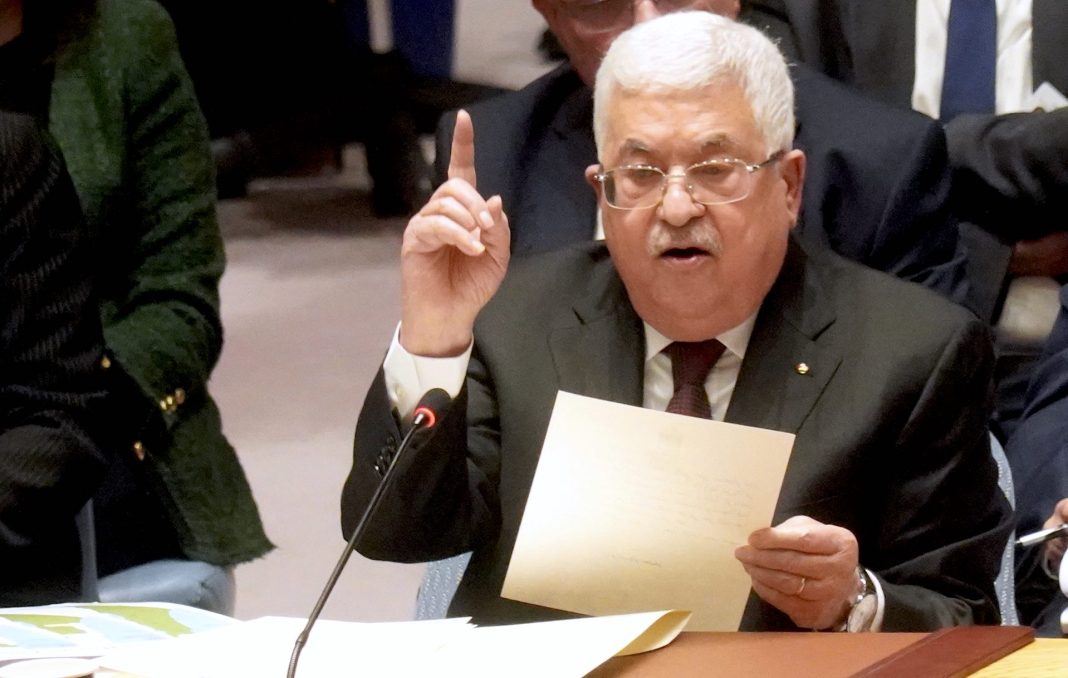UNITED NATIONS (TURKISH JOURNAL) – By Janet Ekstract – On Tuesday, at a United Nations Security Council (UNSC) meeting to discuss U.S. President Trump’s proposal for peace in the Middle East, the Palestinian President Mahmoud Abbas condemned the plan while requesting the Security Council assist the Palestinians in beginning a new negotiation.
Abbas said he came to the Council on behalf of 13 million Palestinians and emphasized that the Trump plan violates international law and does not provide for an Arab peace initiative. He said it “cancels the legality of the demands of the Palestinian people for their legitimate right to self-determination and to gain their freedom and independence in their state.” Abbas added that the Trump plan “legitimized what is llegal of settlement, confiscation and annexation of the Palestinian lands.”
The Palestinian leader said Trump’s ‘deal’ should not be considered as “an international reference for negotiations.” He added that it “removes East Jerusalem from Palestinian sovereignty.”
Meanwhile, U.S. Ambassador to the UN, Kelly Craft told the UNSC and the Palestinians that the Trump peace plan is just the start as she explained: “It is the beginning of a conversation – not the end of one.” The U.S. encouraged Abbas to let go of past grievances to work with Israel for a more secure future for both peoples. Craft added: “If you choose the path to peace, America and many other countries will – we will be there.”
Despite Craft’s conciliatory approach, a majority of UNSC members are not on board with the plan because Trump’s plan dismisses the concept of a two-state solution with the pre-1967 borders and would give Israel the right to annex 30 percent of the West Bank during the early part of the plan. Craft reminded the Council that the UN has had more than 800 resolutions on this issue and yet for over 50 years none of its actions have brought about peace between Israelis and Palestinians, she said.
Craft was direct in her criticism of the UN when she said: “With this record of failure this spectacular, it would be folly to suggest that this time was well spent, and that what is needed now is more of the same.” The ambassador added: “It is understandable that emotions are running high today, and that strongly worded statements are being made. President Abbas, I heard you, I heard you speak of hope, I heard your words about the importance of hope. To keep hope alive there must be willingness to compromise, to engage in good faith.” She further commented: “We are not here to merely promise hope. Anyone can promise hope. We are here to deliver on hope because that is what leaders do. It is what we are called to do today.”
Her response also mentioned the need to discuss how to move forward toward a more positive future that she said she believes Trump’s plan offers. Craft said: “this conceptual map represents a historic step toward the establishment of a Palestinian state with a capital in East Jerusalem.”
In addition, Craft remarked that the plan: “shows respect for the Hashemite Kingdom of Jordan’s special role in Muslim holy shrines in Jerusalem and ensures the ability of Muslims from around the world to worship at the al-Aqsa Mosque.” Investments were mentioned as a way to end the cycle of poverty as Craft explained: “more than 50 billion dollars” would be put into a Palestinian state. She added that details of the plan may change and reiterated that it’s simply an “opening offer.”
Yet, the plan offers carte blanche on Israeli demands while leaving Palestinians without a safety net to meet virtually any of their requirements. PLO Secretary-General Saeb Erekat tweeted that Craft definitely did not carefully read the document. As Erekat emphasized: “The plan concluded the negotations on all core issues, and [U.S. envoy Jared] Kushner said it is the only basis for negotiations, i.e: take it or leave it. Read it.”
The Trump plan never included consulations with the Palestinian side and a majority of EU parliamentarians as well as the Organization of Islamic Cooperation and a number of U.S. Jewish organizations are opposing the plan due to its violation of UN resolutions and its absence of a two-state solution that has been the basis of all negotiations in the past.
Certainly, at issue are the facts: Israel has destroyed Palestinian homes for decades while marginalizing the population under the guise of its government’s supposition that Arabs want to destroy Israel and don’t accept its existence. Former U.S. President Barack Obama was a firsthand witness to Netanyahu’s deception. Each time Netanyahu pledged not to create new settlements on Palestinian land, he broke his promises, which is why Obama was unable to see a way forward for Israeli-Palestinian negotiations. Netanyahu continues building settlements on land that according to international law, legally belongs to Palestinians.
The question now remains: Why should anyone expect the Palestinians to give up on their dream of a viable two-state solution just because Israel’s prime minister who was indicted on corruption charges – believes he has the supreme right to do as he pleases. The Trump ‘deal’ plays to everything Netanyahu demands with no real concern for the fact that for decades Palestinians have gone without: without dignity, without their homes, without the right to their land, without freedom of movement. Judging by the reaction of the international community to the Trump ‘deal’ going without will not be an option anymore.




